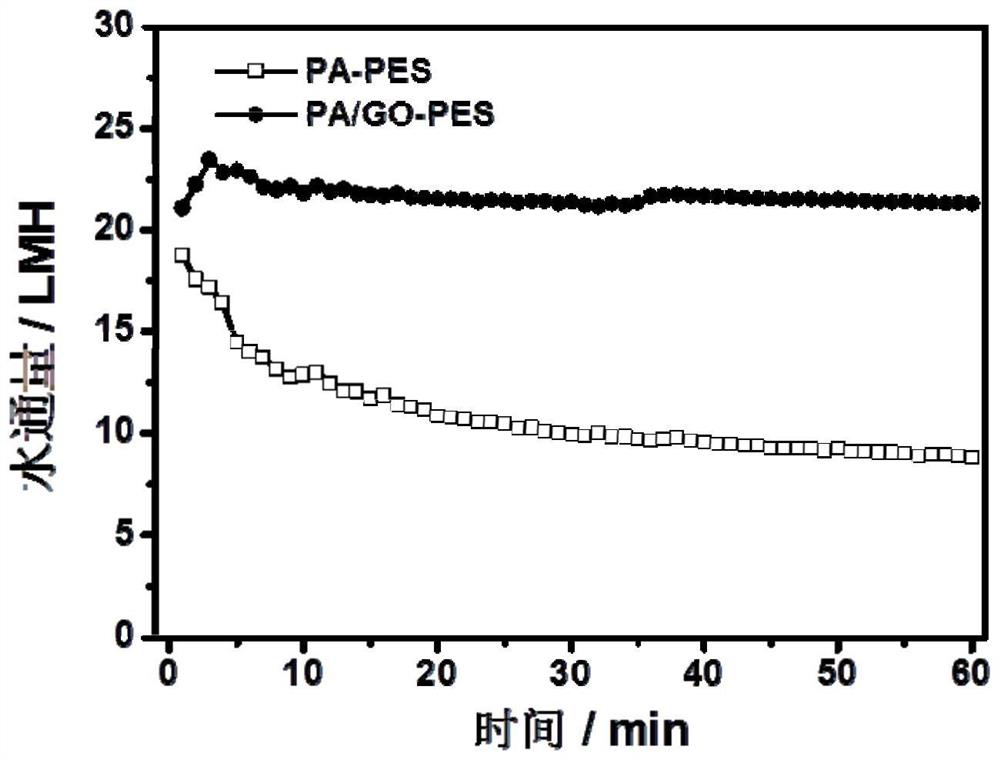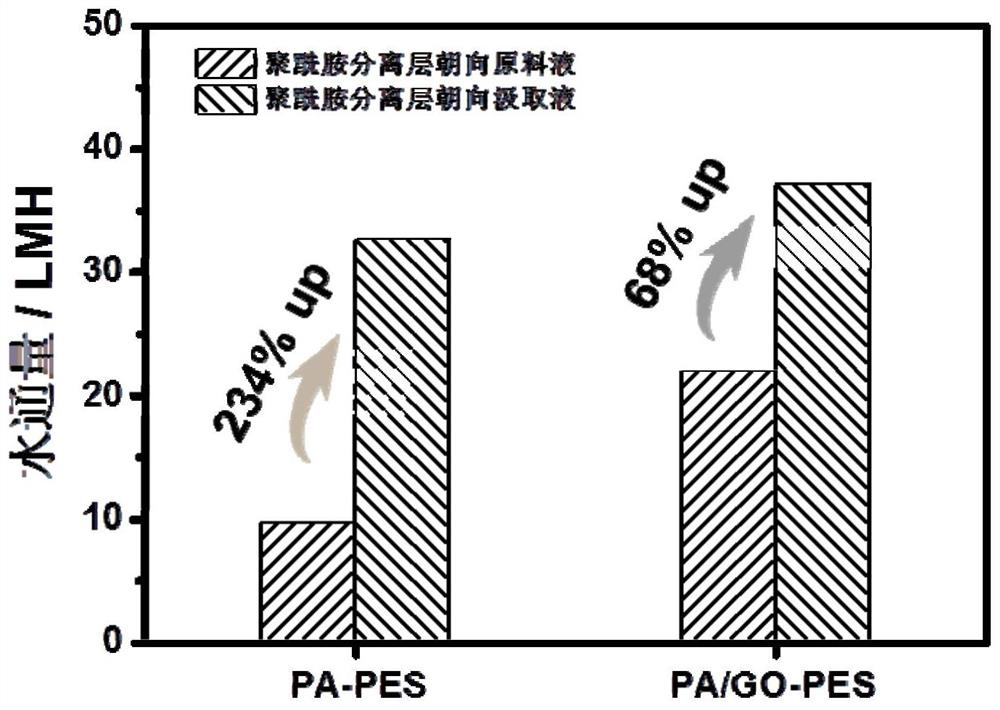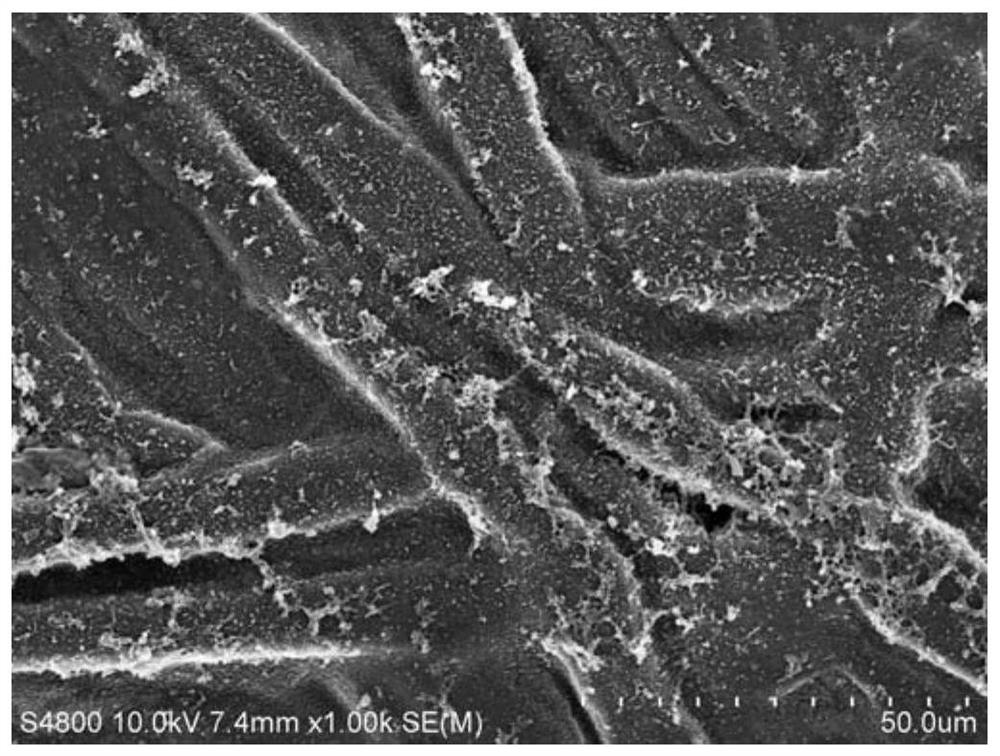A kind of forward osmosis composite membrane and its preparation method and application
A composite membrane and forward osmosis technology, which is applied in the field of membrane separation, can solve the problems of not slowing down the internal concentration polarization in the forward osmosis process, and achieve low mass transfer resistance and reduce the effect of internal concentration polarization
- Summary
- Abstract
- Description
- Claims
- Application Information
AI Technical Summary
Problems solved by technology
Method used
Image
Examples
Embodiment 1
[0035] Preparation of graphene oxide-based polyamide composite membrane:
[0036] 1) A polyethersulfone (PES) microfiltration membrane with an average pore size of 0.8 μm was used as a macroporous substrate, and was pretreated with 2 g / L of dopamine hydrochloride and a Tris buffer solution of pH=8.5 for 10 h.
[0037] 2) In order to obtain a graphene oxide (GO) modified membrane, a 30 ml GO solution with a size of 20 μm and a concentration of 0.004 mg / ml was deposited on the surface of the pretreated PES membrane by vacuum filtration under a pressure of 0.01 MPa. .
[0038]3) Using the above-mentioned PES film deposited on the graphene oxide (GO) layer as a support layer, an interfacial polymerization method is used to form a polyamide separation layer on the graphene oxide (GO) layer to obtain a composite film (that is, the graphene oxide in the composite film). (GO layer as the middle layer): First, the support layer was immersed in an aqueous solution containing 2 wt% m-ph...
Embodiment 2
[0045] Preparation of graphene oxide-based polyamide composite membrane:
[0046] 1) A polyethersulfone (PES) microfiltration membrane with an average pore size of 0.8 μm was used as a macroporous substrate, and was pretreated with 2 g / L of dopamine hydrochloride and a Tris buffer solution of pH=8.5 for 10 h.
[0047] 2) In order to obtain a graphene oxide (GO) modified membrane, a 30 ml GO solution with a size of 20 μm and a concentration of 0.0025 mg / ml was deposited on the surface of the pretreated PES membrane by vacuum filtration under a pressure of 0.01 MPa. .
[0048] 3) Using the above-mentioned PES film deposited on the graphene oxide (GO) layer as a support layer, an interfacial polymerization method is used to form a polyamide separation layer on the graphene oxide (GO) layer to obtain a composite film (that is, the graphene oxide in the composite film). (GO layer as the middle layer): First, the support layer was immersed in a 2 wt% m-phenylenediamine aqueous solu...
Embodiment 3
[0057] Preparation of graphene oxide-based polyamide composite membrane:
[0058] 1) A polyethersulfone (PES) microfiltration membrane with an average pore size of 0.8 μm was used as a macroporous substrate, and was pretreated with 2 g / L of dopamine hydrochloride and a Tris buffer solution of pH=8.5 for 10 h.
[0059] 2) In order to obtain a graphene oxide (GO) modified membrane, a 30 ml GO solution with a size of 20 μm and a concentration of 0.0025 mg / ml was deposited on the surface of the pretreated PES membrane by vacuum filtration under a pressure of 0.01 MPa. .
[0060] 3) Using the above-mentioned PES film deposited on the graphene oxide (GO) layer as a support layer, an interfacial polymerization method is used to form a polyamide separation layer on the graphene oxide (GO) layer to obtain a composite film (that is, the graphene oxide in the composite film). (GO layer as the middle layer): First, the support layer was immersed in a 2 wt% m-phenylenediamine aqueous solu...
PUM
| Property | Measurement | Unit |
|---|---|---|
| thickness | aaaaa | aaaaa |
| thickness | aaaaa | aaaaa |
| thickness | aaaaa | aaaaa |
Abstract
Description
Claims
Application Information
 Login to View More
Login to View More - R&D
- Intellectual Property
- Life Sciences
- Materials
- Tech Scout
- Unparalleled Data Quality
- Higher Quality Content
- 60% Fewer Hallucinations
Browse by: Latest US Patents, China's latest patents, Technical Efficacy Thesaurus, Application Domain, Technology Topic, Popular Technical Reports.
© 2025 PatSnap. All rights reserved.Legal|Privacy policy|Modern Slavery Act Transparency Statement|Sitemap|About US| Contact US: help@patsnap.com



